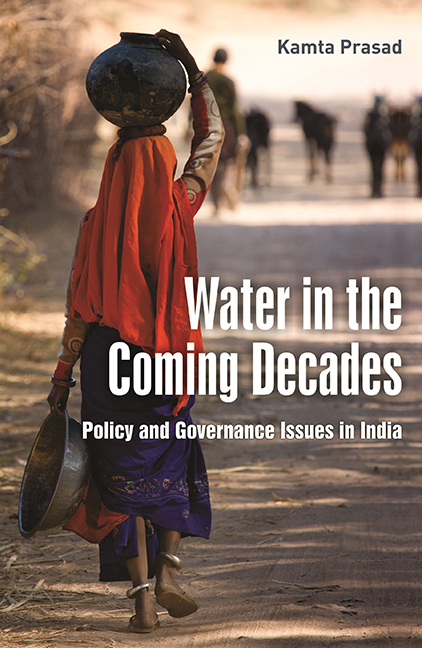Book contents
- Frontmatter
- Dedication
- Contents
- List of Tables
- List of Abbreviations
- Preface
- Acknowledgements
- Section I Overall Perspectives
- Section II Situational Analysis
- Section III Socio-economic, Institutional and Environmental Aspects
- Section IV Technological Options
- Section V Concluding Observations
- References
- Index
1 - The Paradox of Water: Important Yet Neglected
Published online by Cambridge University Press: 13 July 2022
- Frontmatter
- Dedication
- Contents
- List of Tables
- List of Abbreviations
- Preface
- Acknowledgements
- Section I Overall Perspectives
- Section II Situational Analysis
- Section III Socio-economic, Institutional and Environmental Aspects
- Section IV Technological Options
- Section V Concluding Observations
- References
- Index
Summary
Despite its recognized importance, the water sector in India is neglected in actual practice. The neglect is particularly reflected in the grossly inadequate provision of funds by the government to this sector. This chapter highlights these aspects and makes a case for a water-centric approach, which is completely missing in India.
The intrinsic importance of water
Water is the basic requirement for the biological survival of all types of lives, whether they are trees, animals or humans. One may be able to survive without food for several days, but it is not possible to survive without water for long. In addition, the quantity of water needed for the production, processing and cooking of food is several times more than the quantity that we drink. Water is, thus, the basis of food security.
Water provides the basis for agriculture and forestry and, thus, affects the environment. It is used as a component of products in a large variety of industries, especially beverages. It is important for several industrial processes such as cooling, generating steam and cleaning. Water is used to generate electricity and acts as a medium for transportation. It is an essential ingredient of a clean and healthy life. Water, thus, cuts across all sectors: agriculture, industry, energy, domestic supplies, health, education, etc. The survival of humanity, as that of the entire eco-system, depends on water. Because of the highly uneven distribution of water, people as well as flora and fauna tend to congregate near places where water is available in requisite quantity. That is why most cities and commercial centres as well as rural settlements have grown in and around dependable sources of water. The scientists searching for life outside our planet first look for the availability of water to understand if there is potential for sustaining life. Water resources should, therefore, be regarded as a national heritage to be passed on to future generations in good condition so as to ensure the continued development of human civilization.
Increasing global realization of the role of water sector
The need for managing water in a sustainable manner is being articulated throughout the world. There is a growing consensus among the world leaders and the global development community about the urgency of increasing water security.
- Type
- Chapter
- Information
- Publisher: Foundation BooksPrint publication year: 2014



